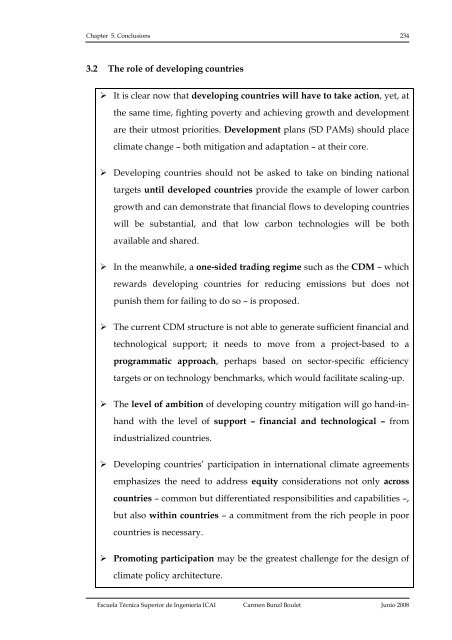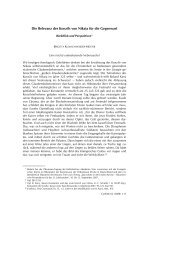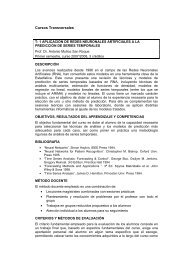- Page 1:
UNIVERSIDAD PONTIFICIA COMILLAS ESC
- Page 4 and 5:
Summary ii Summary The objective of
- Page 6 and 7:
Summary iv The recent rise of secto
- Page 8 and 9:
Resumen vi compromisos para los pa
- Page 10 and 11:
Index viii Index CHAPTER 1. INTRODU
- Page 12 and 13:
Index x 3.1.4 Institutional feasibi
- Page 14 and 15:
Index xii 2.3.9 Overview of sectora
- Page 16 and 17:
Index of figures xiv Index of figur
- Page 18 and 19:
Index of figures xvi Figure 4 - 10.
- Page 20 and 21:
Index of figures xviii unilateral w
- Page 22 and 23:
Index of tables xx Table 3 - 2. Pos
- Page 25 and 26:
1 Introduction
- Page 27 and 28:
Chapter 1. Introduction 3 responsib
- Page 29 and 30:
Chapter 1. Introduction 5 ideas. Fr
- Page 31 and 32:
Chapter 1. Introduction 7 In 1995,
- Page 33 and 34:
Chapter 1. Introduction 9 3 Climate
- Page 35 and 36:
Chapter 1. Introduction 11 The IPCC
- Page 37 and 38:
Chapter 1. Introduction 13 although
- Page 39 and 40:
Chapter 1. Introduction 15 4.2 The
- Page 41 and 42:
Chapter 1. Introduction 17 4.2.1 Fl
- Page 43 and 44:
Chapter 1. Introduction 19 use were
- Page 45 and 46:
Chapter 1. Introduction 21 4.2.1.3
- Page 47 and 48:
Chapter 1. Introduction 23 Some fir
- Page 49 and 50:
Chapter 1. Introduction 25 5.2 Dial
- Page 51 and 52:
Chapter 1. Introduction 27 and Sust
- Page 53 and 54:
Chapter 1. Introduction 29 These me
- Page 55 and 56:
Chapter 1. Introduction 31 COP13 de
- Page 57 and 58:
Chapter 1. Introduction 33 COP/MOP5
- Page 59 and 60:
Chapter 1. Introduction 35 asking f
- Page 61 and 62:
Chapter 2. Options for future clima
- Page 63 and 64:
Chapter 2. Options for future clima
- Page 65 and 66:
Chapter 2. Options for future clima
- Page 67 and 68:
Chapter 2. Options for future clima
- Page 69 and 70:
Chapter 2. Options for future clima
- Page 71 and 72:
Chapter 2. Options for future clima
- Page 73 and 74:
Chapter 2. Options for future clima
- Page 75 and 76:
Chapter 2. Options for future clima
- Page 77 and 78:
Chapter 2. Options for future clima
- Page 79 and 80:
Chapter 2. Options for future clima
- Page 81 and 82:
Chapter 2. Options for future clima
- Page 83 and 84:
Chapter 2. Options for future clima
- Page 85 and 86:
Chapter 2. Options for future clima
- Page 87 and 88:
Chapter 2. Options for future clima
- Page 89 and 90:
Chapter 2. Options for future clima
- Page 91 and 92:
Chapter 2. Options for future clima
- Page 93 and 94:
Chapter 2. Options for future clima
- Page 95 and 96:
Chapter 2. Options for future clima
- Page 97 and 98:
Chapter 2. Options for future clima
- Page 99 and 100:
Chapter 2. Options for future clima
- Page 101 and 102:
Chapter 2. Options for future clima
- Page 103 and 104:
Chapter 2. Options for future clima
- Page 105 and 106:
Chapter 2. Options for future clima
- Page 107 and 108:
Chapter 2. Options for future clima
- Page 109 and 110:
Chapter 2. Options for future clima
- Page 111 and 112:
Chapter 2. Options for future clima
- Page 113 and 114:
Chapter 2. Options for future clima
- Page 115 and 116:
Chapter 2. Options for future clima
- Page 117 and 118:
Chapter 2. Options for future clima
- Page 119 and 120:
Chapter 2. Options for future clima
- Page 121 and 122:
Chapter 2. Options for future clima
- Page 123 and 124:
Chapter 2. Options for future clima
- Page 125 and 126:
Chapter 2. Options for future clima
- Page 127 and 128:
Chapter 2. Options for future clima
- Page 129 and 130:
Chapter 2. Options for future clima
- Page 131 and 132:
Chapter 2. Options for future clima
- Page 133 and 134:
Chapter 2. Options for future clima
- Page 135 and 136:
Chapter 2. Options for future clima
- Page 137 and 138:
Chapter 2. Options for future clima
- Page 139 and 140:
Chapter 2. Options for future clima
- Page 141 and 142:
Chapter 2. Options for future clima
- Page 143 and 144:
Chapter 2. Options for future clima
- Page 145 and 146:
Chapter 2. Options for future clima
- Page 147 and 148:
Chapter 2. Options for future clima
- Page 149 and 150:
Chapter 2. Options for future clima
- Page 151 and 152:
Chapter 2. Options for future clima
- Page 153 and 154:
Chapter 3. Implications of future c
- Page 155 and 156:
Chapter 3. Implications of future c
- Page 157 and 158:
Chapter 3. Implications of future c
- Page 159 and 160:
Chapter 3. Implications of future c
- Page 161 and 162:
Chapter 3. Implications of future c
- Page 163 and 164:
Chapter 3. Implications of future c
- Page 165 and 166:
Chapter 3. Implications of future c
- Page 167 and 168:
Chapter 3. Implications of future c
- Page 169 and 170:
Chapter 3. Implications of future c
- Page 171 and 172:
Chapter 3. Implications of future c
- Page 173 and 174:
Chapter 3. Implications of future c
- Page 175 and 176:
Chapter 3. Implications of future c
- Page 177 and 178:
Chapter 3. Implications of future c
- Page 179 and 180:
Chapter 3. Implications of future c
- Page 181 and 182:
Chapter 3. Implications of future c
- Page 183 and 184:
Chapter 3. Implications of future c
- Page 185 and 186:
Chapter 3. Implications of future c
- Page 187 and 188:
4 Case study: Spain
- Page 189 and 190:
Chapter 4. Case Study: Spain 165 re
- Page 191 and 192:
Chapter 4. Case Study: Spain 167 Sp
- Page 193 and 194:
Chapter 4. Case Study: Spain 169 Fi
- Page 195 and 196:
Chapter 4. Case Study: Spain 171 in
- Page 197 and 198:
Chapter 4. Case Study: Spain 173 Ta
- Page 199 and 200:
Chapter 4. Case Study: Spain 175 Fu
- Page 201 and 202:
Chapter 4. Case Study: Spain 177 So
- Page 203 and 204:
Chapter 4. Case Study: Spain 179 Ta
- Page 205 and 206:
Chapter 4. Case Study: Spain 181 Fi
- Page 207 and 208: Chapter 4. Case Study: Spain 183 2.
- Page 209 and 210: Chapter 4. Case Study: Spain 185 Ag
- Page 211 and 212: Chapter 4. Case Study: Spain 187 In
- Page 213 and 214: Chapter 4. Case Study: Spain 189 Si
- Page 215 and 216: Chapter 4. Case Study: Spain 191 ne
- Page 217 and 218: Chapter 4. Case Study: Spain 193 av
- Page 219 and 220: Chapter 4. Case Study: Spain 195 th
- Page 221 and 222: Chapter 4. Case Study: Spain 197 Im
- Page 223 and 224: Chapter 4. Case Study: Spain 199 Th
- Page 225 and 226: Chapter 4. Case Study: Spain 201 Th
- Page 227 and 228: Chapter 4. Case Study: Spain 203 1,
- Page 229 and 230: Chapter 4. Case Study: Spain 205 Ne
- Page 231 and 232: Chapter 4. Case Study: Spain 207 So
- Page 233 and 234: Chapter 4. Case Study: Spain 209 19
- Page 235 and 236: Chapter 4. Case Study: Spain 211 Ta
- Page 237 and 238: Chapter 4. Case Study: Spain 213 %
- Page 239 and 240: Chapter 4. Case Study: Spain 215 Mo
- Page 241 and 242: Chapter 4. Case Study: Spain 217 ab
- Page 243 and 244: Chapter 4. Case Study: Spain 219 ba
- Page 245 and 246: Chapter 4. Case Study: Spain 221 Ta
- Page 247 and 248: Chapter 4. Case Study: Spain 223 30
- Page 249 and 250: Chapter 5. Conclusions 225 1 Introd
- Page 251 and 252: Chapter 5. Conclusions 227 further
- Page 253 and 254: Chapter 5. Conclusions 229 3.1 Emis
- Page 255 and 256: Chapter 5. Conclusions 231 China’
- Page 257: Chapter 5. Conclusions 233 attracti
- Page 261 and 262: Chapter 5. Conclusions 237 change a
- Page 263 and 264: Chapter 5. Conclusions 239 3.3 Inte
- Page 265 and 266: Chapter 5. Conclusions 241 Technolo
- Page 267 and 268: Chapter 5. Conclusions 243 3.4 Sect
- Page 269 and 270: Chapter 5. Conclusions 245 The Japa
- Page 271 and 272: Chapter 5. Conclusions 247 The next
- Page 273 and 274: Chapter 5. Conclusions 249 conditio
- Page 275 and 276: Chapter 5. Conclusions 251 Adaptati
- Page 277 and 278: References 253 References Abanades,
- Page 279 and 280: References 255 IPCC, 2007. Climate
- Page 281: References 257 Persson, T.A., C. Az

















